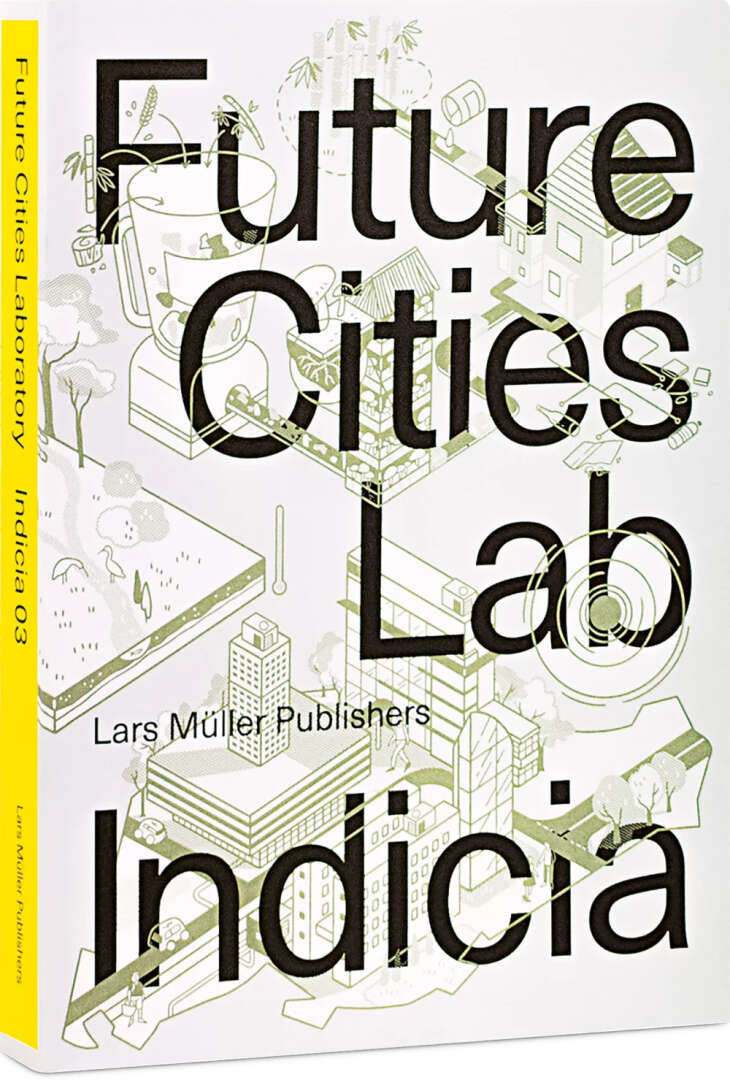
This third and final volume in the Indicia book series presents the results of the Future Cities Laboratory research program in the form of actions for sustainable city-making. It complements the first and second volumes of the series that respectively documented the research challenges and approaches that prefigured these results. Read together, the three volumes chart the full arc and many productive eddies of the five-year program and its mission to shape sustainable future cities.
Research results are presented as condensed actions that take the form of general principles, recommendations and practical guidelines. The actions are neither technical standards nor prescriptive checklists but invitations to explore, test and refine research insights within the context in which the reader lives, works and acts. The credibility, salience and legitimacy of each action is underpinned by scientific publications (journal articles, books and exhibitions) presented in extensive footnotes and suggestions for further reading.
Artisans from Anku have built yurts and cabins through several participatory architecture projects and reuse research and teaching exercises, in collaboration with researchers from the Circular Engineering for Architecture (CEA) lab. After building a yurt with natural and reclaimed materials as well as building a dome for teaching circular construction to ETH Zurich students, there was some waste material left which was too small to be used in a full-scale structure. The materials originally are from the disassembly of buildings set for demolition, such as the Music Pavillion of a Psychiatric Clinic in Zurich. These elements were integrated in the design of this stool.
A transition to a circular economy, in which used materials may become valuable resources for a new production cycle, is urgently needed. This project aims to develop integrated frameworks and tools based on advanced digital technology for informing the design, construction and management of circular buildings and deploying more effective resource solutions. It addresses the questions of which contributions future circular cities can make to lower adverse environmental impacts and how to derive tailored, site-specific system solutions for sustainable housing.
Find out more aboutEmerging Models of Sustainable Integrated Development explores sustainable integrated districts (SIDs) as models for high-density high- liveability future cities by studying urban innovations and systems solutions that are deployed and integrated at the district scale. Important aspects of the system performance of SIDs are captured by an interdisciplinary team of researchers that works closely with important stakeholders from government agencies and industry.
Find out more aboutThe objective of this module is to efficiently reduce energy consumption and to increase solar energy production in cities while minimizing total greenhouse gas (GHG) emissions. The research includes the development of holistic, multi-scale and interdisciplinary approaches for assessing large scale deployment of (building integrated) photovoltaic in realistic urban contexts under different climatic, socio-economic and architectural conditions. Zurich and Singapore are used as complementary case studies and we are interacting with public stakeholders and agencies to directly apply research into practice by receiving feedback and providing training on toolboxes developed.
Find out more aboutThis module focuses on mitigating climate impacts at the sea-city fringes in rapidly urbanising cities in tropical Asia. Firstly, it studies measures to mitigate climate change and its effects through urban design and planning (concept plan), environmental science, and biomimicry technology to capture, absorb, store and remove CO2 from the atmosphere. Secondly, it develops practical and scalable nature-based approaches to mitigate the effects of climate change and rising seas through urban design and biophilic approaches for water-sensitive design. Thirdly, it studies the interplay between climate change, an ageing population, and emerging economic developments, promoting current and future liveability.
Find out more aboutThe overall goal of the module is to design and plan functioning blue and green infrastructures, which not only improve urban water efficiency and reduce flooding, but also support local food production, mitigate heat island effects, increase water pollution control, recreation, biodiversity, and ultimately provide jobs for and a higher life quality of citizens. By securing and/or introducing these nature-based (green) stormwater managements (blue) in the urban fabric, we expect the hinterlands to become more resilient to climate change and population growth.
Find out more aboutThe Agropolitan Territories module addresses the unsustainable relationship between urbanisation and food production in monsoon Asia. Globally, urban land expansion is consuming fertile agricultural land at unprecedented rates. Simultaneously, the industrialised agricultural practices developed to meet the food needs of urbanised populations are placing pressure on a range of ecological systems. The module is developing an 'agropolitan' outlook to this challenge, foregrounding the inter-dependence of future cities and future agriculture. It is doing so by developing transdisciplinary and multi-scaled approaches to data collection and analysis, dynamic planning support tools, and designs and prototypes for sustainable agropolitan territories.
Find out more aboutThrough analysis of several case studies in Europe and Asia, the project aims at a better understanding of processes of extended urbanisation in agricultural territories, exploring their characteristics, outlining potentials for agroecological transitions, and formulating concrete design strategies and governance models. The interdisciplinary module contains work packages covering the sustainable agroecological design and governance arrangements, novel soil ecologies, nature's contributions to people, and the impact of renewable energy extraction in agricultural territories.
Find out more aboutThe Engagement Platform is a cyber-physical space which supports and disseminates the vision, narrative and values of Future Cities Laboratory Global.
Find out more about